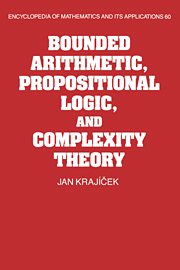Book contents
- Frontmatter
- Contents
- Preface
- Acknowledgments
- 1 Introduction
- 2 Preliminaries
- 3 Basic complexity theory
- 4 Basic propositional logic
- 5 Basic bounded arithmetic
- 6 Definability of computations
- 7 Witnessing theorems
- 8 Definability and witnessing in second order theories
- 9 Translations of arithmetic formulas
- 10 Finite axiomatizability problem
- 11 Direct independence proofs
- 12 Bounds for constant-depth Frege systems
- 13 Bounds for Frege and extended Frege systems
- 14 Hard tautologies and optimal proof systems
- 15 Strength of bounded arithmetic
- References
- Subject index
- Name index
- Symbol index
6 - Definability of computations
Published online by Cambridge University Press: 02 December 2009
- Frontmatter
- Contents
- Preface
- Acknowledgments
- 1 Introduction
- 2 Preliminaries
- 3 Basic complexity theory
- 4 Basic propositional logic
- 5 Basic bounded arithmetic
- 6 Definability of computations
- 7 Witnessing theorems
- 8 Definability and witnessing in second order theories
- 9 Translations of arithmetic formulas
- 10 Finite axiomatizability problem
- 11 Direct independence proofs
- 12 Bounds for constant-depth Frege systems
- 13 Bounds for Frege and extended Frege systems
- 14 Hard tautologies and optimal proof systems
- 15 Strength of bounded arithmetic
- References
- Subject index
- Name index
- Symbol index
Summary
This chapter presents important definability results for fragments of bounded arithmetic.
A Turing machine M will be given by its set of states Q, the alphabet Σ, the number of working tapes, the transition function, and its clocks, that is, an explicit time bound. Most results of the form “Given machine M the theory T can prove …” could be actually proved in a bit stronger form: “For any k the theory T can prove that for any M running in time ≥ nk …” A natural formulation for such results is in terms of models of T and computations within such models, but in this chapter we shall omit these formulations.
An instantaneous description of a computation of machine M on input x consists of the current state, the positions of the heads, the content of all tapes, and the current time: That is, it is a sequence of symbols whose length is proportional to the time bound for n:= |x|.
A computation will be coded by the sequence of the consecutive instantaneous descriptions.
Now we shall consider several bounded formulas defining these elementary concepts. They are all in the language L+ and thus also (by Lemma 5.4.1) in L.
- Type
- Chapter
- Information
- Publisher: Cambridge University PressPrint publication year: 1995



